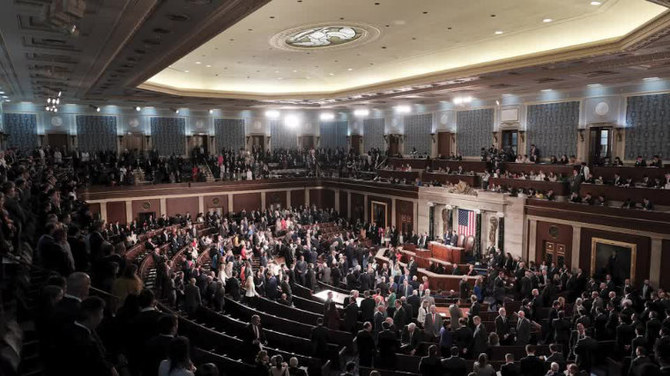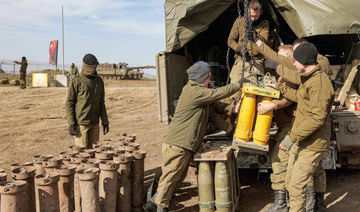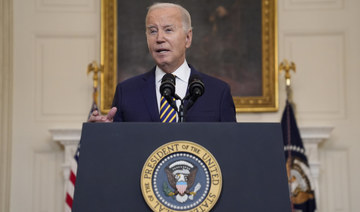WASHINGTON: US Democrats said on Tuesday they would wait to decide how to respond to a proposal from the Republican-led House of Representatives to consider national security assistance for Ukraine, Israel and Taiwan separately, rather than as one bill.
More than two months after the Senate approved a $95 billion package of security assistance for Ukraine, Israel and Taiwan and other US partners in the Indo-Pacific, House Speaker Mike Johnson said on Monday that the House would consider the aid this week, but would do so as separate pieces of legislation.
The proposal fueled uncertainty about the long-awaited aid package, particularly for Ukraine, given fierce opposition toward from some far-right Republicans, who have threatened to oust Johnson if he allows a House vote on assistance for Kyiv.
Democrats in the House and Senate — and the White House — said they would look at Johnson’s proposals, even as they stressed that the best and quickest strategy would be for the House to pass the legislation approved by the Senate in February.
Johnson’s plan was endorsed on Tuesday by the leaders of the House Appropriations, Armed Services, Foreign Affairs and Intelligence committees, and the chairperson of the defense appropriations subcommittee.
“We don’t have time to spare when it comes to our national security. We need to pass this aid package this week,” Representatives Tom Cole, Mike Rogers, Michael McCaul, Mike Turner and Ken Calvert said in a joint statement.
Turner and Representative Jim Himes, the top Democrat on the intelligence panel, said separately in a statement after a classified briefing that Ukraine’s situation on the ground was critical and aid must be passed now.
Consideration of separate bills could add weeks to the timeline for the aid to become law, as it must pass the House and then go back for a vote in the Senate, before it can be sent to the White House for Democratic President Joe Biden’s signature.
“I am reserving judgment on what will come out of the House until we see more about the substance of the proposal and the process by which the proposal will proceed,” Senator Chuck Schumer said as the Senate opened.
“Hopefully, we will get details of the speaker’s proposal later today. Again, time is of the essence,” Schumer said.
Representative Pete Aguilar, a member of the House Democratic leadership, told a press conference he would wait for the substance of the bill before drawing any conclusions.
“We don’t want to sink any plan that delivers aid to our allies,” he said.
TEXT, TIMELINE STILL TO COME
The text of the bills was not released — it was expected as soon as late Tuesday — but there would be separate measures providing assistance to Ukraine as it fights a Russian invasion, Israel after the Oct. 7 attack by Hamas and a weekend air assault by Iran, and partners in the Indo-Pacific as they face an increasingly aggressive China.
It also was not clear which country’s assistance the House would consider first. Republicans have tried repeatedly to push through aid for Israel without anything for Ukraine, an approach Democrats have rejected.
The White House has also opposed standalone aid for Israel.
When asked whether the White House would support the four separate bills, White House National Security spokesman John Kirby said the administration was awaiting more information.
“It does appear at first blush that the speaker’s proposal will, in fact, help us get aid to Ukraine, aid to Israel and needed resources to the Indo-Pacific for a wide range of contingencies there. We just want to get more detail,” he told reporters.
Johnson told Fox News on Tuesday that the fourth bill would include additional sanctions on Russia and Iran as well as the “REPO Act,” a provision regarding the seizure of Russian assets to help Ukraine.
Ukraine backers have been pushing Johnson to allow a vote on supplemental funding since last year. But Johnson had given a variety of reasons to delay, including the need to focus taxpayer dollars on domestic issues.
Many hard-right Republicans, especially those closely allied with former President Donald Trump, who is challenging Biden in the November presidential election, fiercely oppose sending billions more dollars to Ukraine.
At least two far-right Republicans have threatened to seek Johnson’s removal as speaker if he allows a vote on assistance for Ukraine. Johnson said he would not resign.
It was not clear whether he would be removed in case of a hard-right rebellion, as some Democrats have said they would vote to save Johnson’s job to prevent chaos in the House. Last year, conservatives ousted then-Speaker Kevin McCarthy, and it took three weeks before Johnson was elected.
























